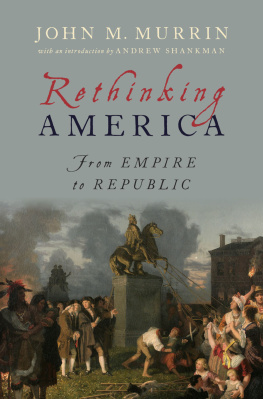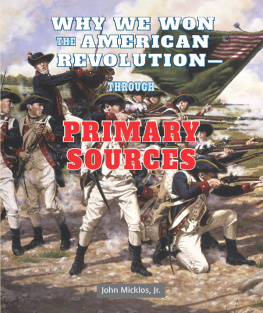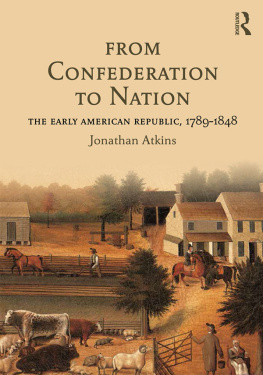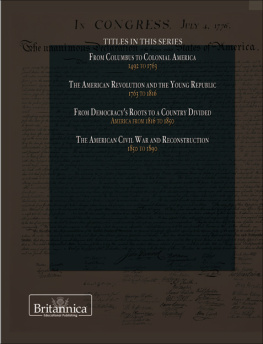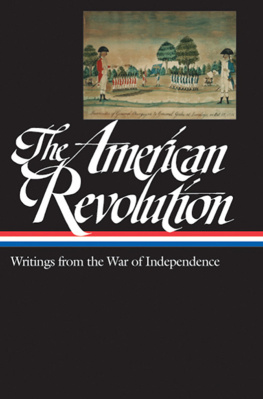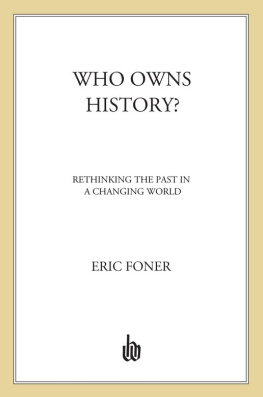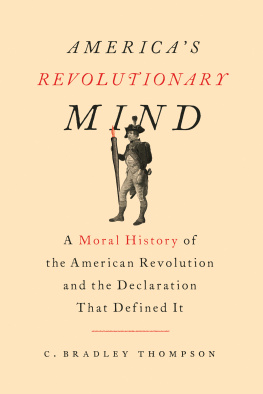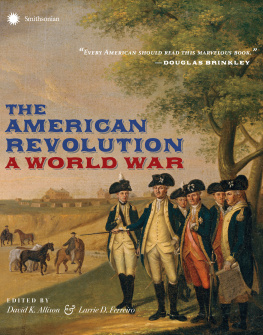Contents
Pagebreaks of the print version
RETHINKING AMERICA


Oxford University Press is a department of the University of Oxford. It furthers the Universitys objective of excellence in research, scholarship, and education by publishing worldwide. Oxford is a registered trade mark of Oxford University Press in the UK and certain other countries.
Published in the United States of America by Oxford University Press 198 Madison Avenue, New York, NY 10016, United States of America.
John M. Murrin 2018
Introduction Oxford University Press 2018
All rights reserved. No part of this publication may be reproduced, stored in a retrieval system, or transmitted, in any form or by any means, without the prior permission in writing of Oxford University Press, or as expressly permitted by law, by license, or under terms agreed with the appropriate reproduction rights organization. Inquiries concerning reproduction outside the scope of the above should be sent to the Rights Department, Oxford University Press, at the address above.
You must not circulate this work in any other form and you must impose this same condition on any acquirer.
CIP data is on file at the Library of Congress
ISBN 9780195038712
eISBN 9780190870546
In fond memory of Edmund S. Morgan
CONTENTS

Andrew Shankman
Andrew Shankman
Andrew Shankman

I ARRIVED AT Princeton University in the summer of 1992 for my first semester of graduate school, equally eager and overwhelmed to study with John Murrin. One of my undergraduate professors, Stephen Foster, had known Murrin since their days at Yale working with Edmund Morgan. Another, Allan Kulikoff, had been Murrins colleague at Princeton for several years. A third, Simon Newman, had been Murrins student. And a fourth, Alfred F. Young, doubted Murrins political commitments, but confirmed what the other three said: that Murrin seemed to know everything. Murrin was, Young told me, co-writing an essay for the volume Young was currently editing, an essay that Young assured me was stunning.
That spring I had first sensed another equally important quality of John Murrins when I read a brief note he had written to Kulikoff and had enclosed with the final volume of the biographical dictionary Princetonians. Princetonians ran to five volumes, published between 1976 and 1991, and covered the years 1748 to 1794. Murrins name appears nowhere as an editor. Yet he devoted a great deal of time to the project due to his deep interest in the history of the university where he worked for over thirty years, and because of his devotion to the memory and legacy of Princetons previous early Americanist, Wesley Frank Craven. The note, to the best of my memory, read Dear Allan, here is the latest volume of Princetonians. I expect you to read every word. John. P.S. Andrew Shankman is on the admit list. And so, my life changed forever. As I tried to absorb the note in a hallway outside a classroom, I could concentrate enough to realize that it was a humorous little letter. It was funny, while also being ingenuously modest, self-deprecating, and a little bit impish.
As I would come to know, Murrin is joyful both in learning and mischief. Though Morgans quotation captures Murrin as well as it does Stiles, equally revealing is a brief passage from one of Murrins essays in Rethinking America, No Awakening, No Revolution? More Counterfactual Speculations. It is one of the two essays in the volume that are organized around a counterfactual question, a very difficult exercise to do well, and one at which Murrin excels. In No Awakening Murrin expunges the first Great Awakening from history to assess what difference that would make for the coming of the American Revolution. The only way to erase the Awakening is to provide plausible explanations for the disappearances of George Whitfield, Jonathan Edwards, and Gilbert Tennant before they could cause any serious trouble. By imprisoning Whitfield in a Spanish dungeon during the War of Jenkins Ear, reducing Edwards to a permanent catatonic stupor, and killing off Tennant with a bolt of lightning (after all, who didnt know that Tennant was struck by lightning in 1745 but survived?), Murrin dispatched the three with wholehearted glee, explaining that it was one of the forbidden delights that such counterfactual musings can provide to any suitably degenerate mind. Combining these Morgan and Murrin quotations brings one closer to knowing Murrin for those who have not met him.
Within days of arriving at Princeton, I had heard about the collected essays project. My fellow Murrin students (there were always many) explained that he had written far more essays than I realized, over forty, possibly more than fifty. Nobody seemed to know for sure, because some of the best were published in obscure hard-to-find volumes, and some of the very best were still in a drawer somewhere. I remember wanting access to that drawer. But I was not to give up hope, for Murrin had a contract with Oxford University Press and would be publishing his collected essays in two volumes, or was it three? There was spirited debate about that and the details were hazy. But it was coming soon, quite soon, and the erudition of this monstrous warehouse of knowledge would be widely available. I remember that summer telling somebody that I hoped it would all happen in time for my general exams.
Twenty three years after passing those exams, for me it is a momentous occasion and an enormous pleasure to help make widely available eleven of John Murrins essential essays treating the American Revolution and the early American Republic. Rethinking America addresses essential questions and controversies that have long shaped our understanding of the nations origins and that should continue to inform the discussions of current and future historians. In doing so, these essays deeply probe themes and issues that are central to the surprising, awe-inspiring, and often deeply troubling formation and development of the United States.
I am grateful to Anthony Grafton and William Chester Jordan of Princeton University, Daniel K. Richter of the McNeil Center for Early American Studies and the University of Pennsylvania, and David Waldstreicher of the CUNY Graduate Center, who read my introduction and helped me with their encouragement to improve it. I also thank Susan Ferber of Oxford University Press, who remained devoted to Rethinking America and who imagined that I could be of use to its completion. And above all, my enduring thanks to my adviser and friend John Murrin, the author of the feast.
Notes
The essay, The Making and Unmaking of an American Ruling Class, is included in this volume.
Edmund S. Morgan, The Gentle Puritan: A Life of Ezra Stiles, 17271795 (New York: W. W. Norton, 1962), 134.
RETHINKING AMERICA


